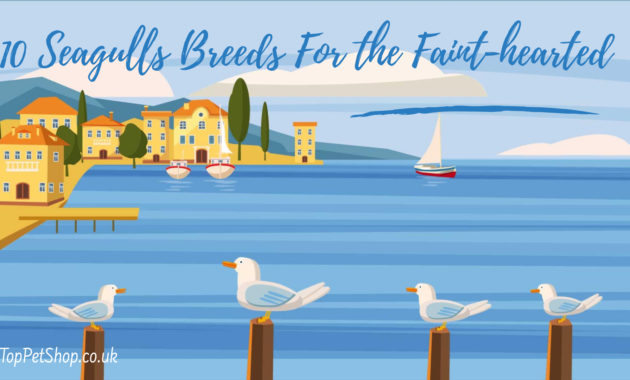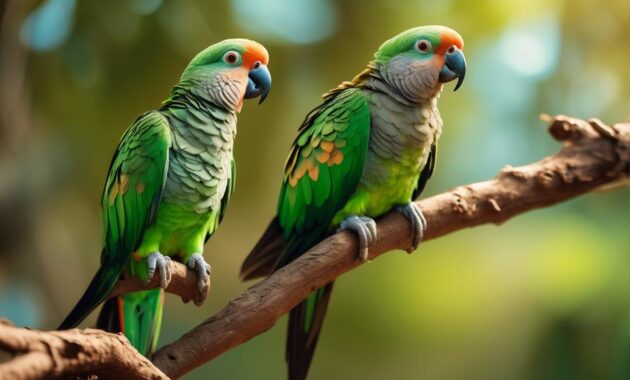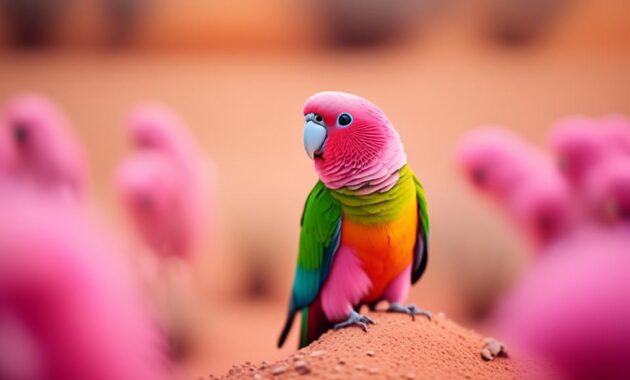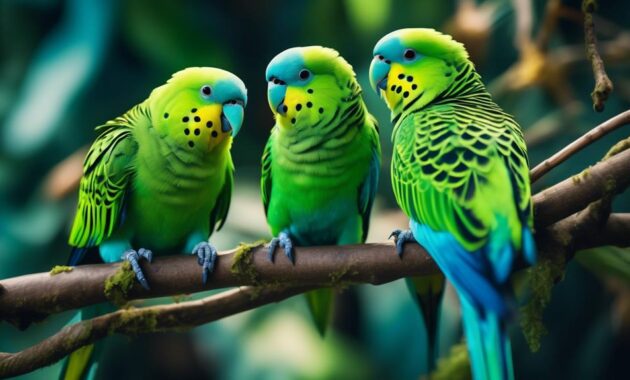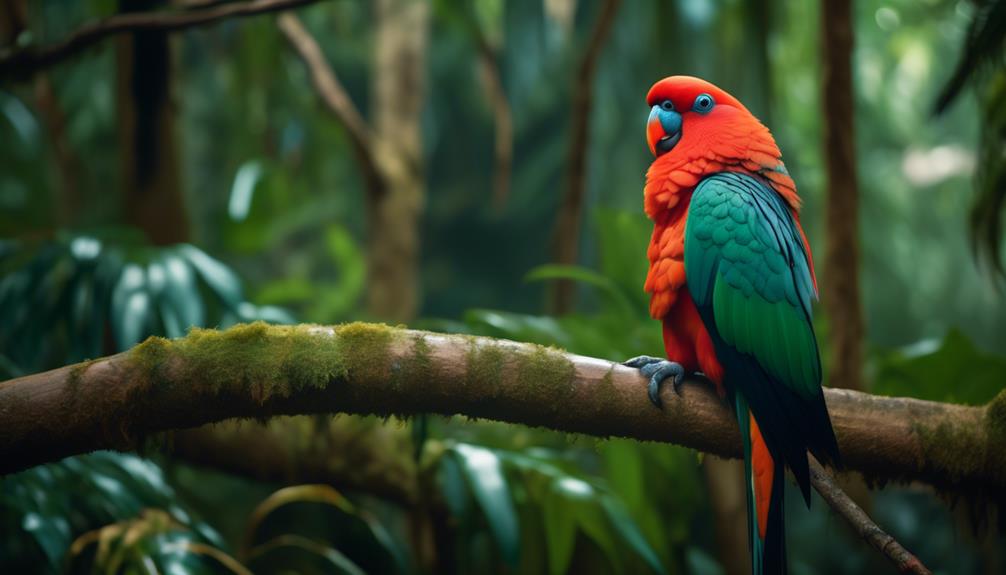
Picture a vibrant tapestry of emerald green, sapphire blue, and fiery red, soaring through the dense rainforests of Indonesia.
The Moluccan King Parrot, with its resplendent plumage and charismatic personality, has long been an enchanting sight for bird enthusiasts.
However, this captivating species now faces a growing menace that threatens its very existence. In the face of illegal capture and habitat destruction, the future of this exotic parrot hangs in the balance.
But there is hope. Join us as we explore the challenges that the Moluccan King Parrot confronts and delve into the urgent need for conservation efforts to secure its future.
Key Takeaways
- The Moluccan King Parrot is a vibrant and charismatic bird species that belongs to the Parrot family, with a lifespan of 20-25 years.
- The species is facing threats from illegal capture for the exotic pet trade, habitat destruction through deforestation, and disruption of the delicate ecosystem.
- Deforestation leads to the loss of habitat, food sources, and nesting sites for the parrots, as well as fragmentation of populations and increased human-wildlife conflict.
- Climate change further exacerbates the species’ vulnerability, with rising temperatures and changing weather patterns causing unstable rainforest ecosystems and disruptions in food availability and nesting sites. Urgent action is needed to combat these threats and protect the Moluccan King Parrot.
Overview of the Moluccan King Parrot
The Moluccan King Parrot, a vibrant and charismatic bird species, captivates its observers with its stunning mix of green, blue, and red feathers. Measuring 14 inches in size, this parrot belongs to the Parrot species and has a lifespan of 20-25 years.
It produces quiet sounds, natural calls, and can even mimic other sounds. Known for its social, sweet, friendly, intelligent, playful, and energetic nature, the Moluccan King Parrot is comparable to the Hyacinth Macaw and Alexandrine Parakeet breeds.
Native to regions in present-day Indonesia, including the Maluku and Peleng islands, West Papua, and northern New Guinea, it thrives in large rainforests and can also be found in plantations, gardens, and farmlands. Unfortunately, the wild populations of this beautiful bird are increasingly threatened by illegal capture and habitat destruction.
Threats to the Moluccan King Parrot’s Natural Habitat
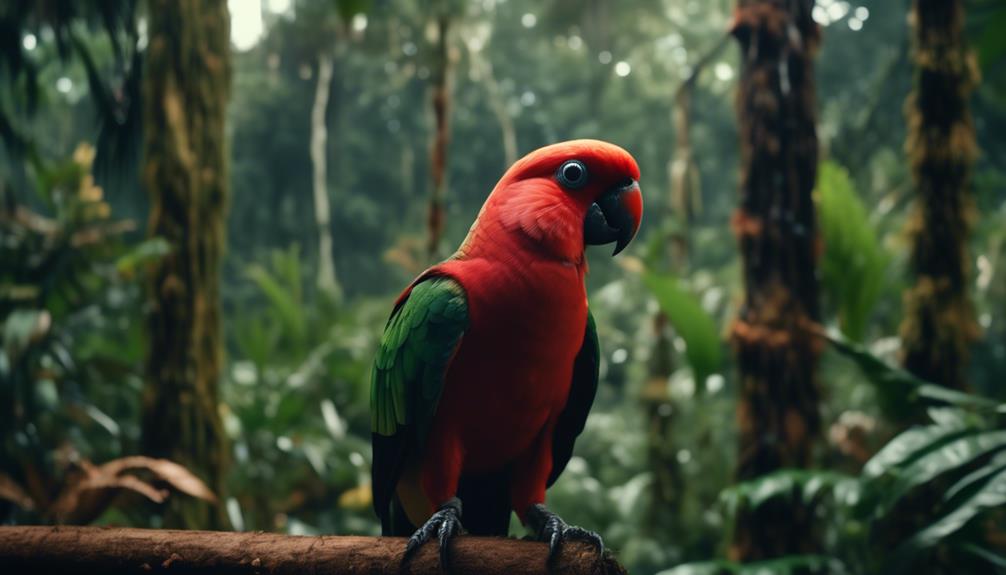
Illegal capture and habitat destruction pose significant threats to the natural habitat of the Moluccan King Parrot. The wild populations of these beautiful birds, native to regions in present-day Indonesia, are increasingly endangered. Here’s a table that highlights the main threats to their natural habitat:
| Threats | Description |
|---|---|
| Illegal capture | The demand for exotic pets fuels the illegal trade of Moluccan King Parrots. They are often captured and sold on the black market. |
| Habitat destruction | Deforestation and land conversion for agriculture destroy the large rainforests where these parrots thrive. |
These threats not only disrupt the delicate balance of the ecosystem but also endanger the survival of the Moluccan King Parrot species. Conservation efforts and stricter regulations are necessary to protect their natural habitat and ensure their long-term survival.
Illegal Capture and the Pet Trade
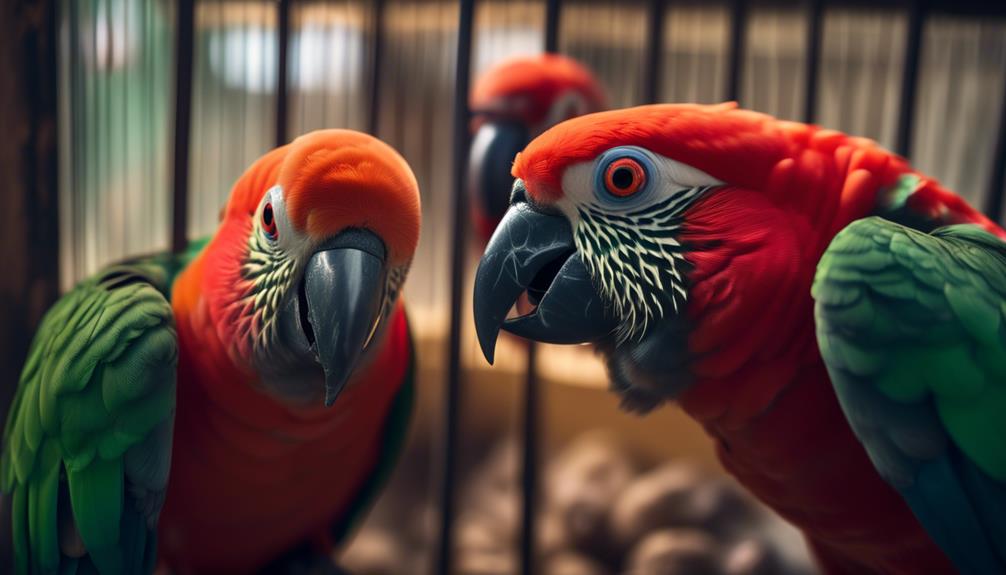
As we shift our focus to the issue of illegal capture and the pet trade, it’s important to address the alarming impact it has on the Moluccan King Parrot’s natural habitat and population.
The illegal capture of these beautiful parrots for the pet trade has devastating consequences for their survival in the wild. Not only does it disrupt their natural habitat, but it also leads to a decline in their population. The demand for exotic pets fuels this illegal trade, causing immense harm to these magnificent birds.
The Moluccan King Parrot’s natural habitat is already under threat from deforestation and habitat destruction, and the additional pressure from illegal capture for the pet trade exacerbates the situation.
Urgent action is needed to combat this illegal activity and protect these endangered parrots from further harm.
Impact of Deforestation on the Moluccan King Parrot
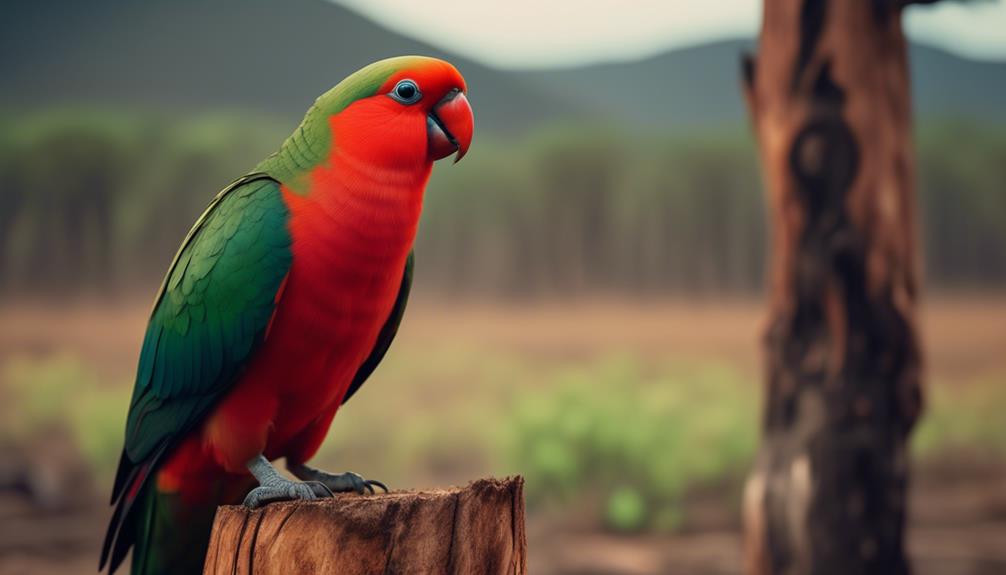
Deforestation poses a significant threat to the survival of the Moluccan King Parrot. It destroys their natural habitat and disrupts their delicate ecosystem. The impact of deforestation on these beautiful birds includes loss of habitat, fragmentation of populations, disruption of food chains, and increased human-wildlife conflict.
Loss of Habitat: Deforestation removes the trees and vegetation that the Moluccan King Parrot relies on for food, shelter, and nesting. Without these essential resources, their survival becomes increasingly difficult.
Fragmentation of Populations: As deforestation continues, the remaining patches of forest become isolated from each other, fragmenting the Moluccan King Parrot populations. This fragmentation can lead to reduced genetic diversity and increased vulnerability to diseases.
Disruption of Food Chains: Deforestation disrupts the intricate web of relationships within the ecosystem, affecting the availability of food sources for the Moluccan King Parrot. This can lead to malnutrition and a decline in their overall health.
Increased Human-Wildlife Conflict: Deforestation often results in the expansion of human settlements and agricultural activities, bringing humans and the Moluccan King Parrot into closer proximity. This can lead to conflicts, where the parrots may be harmed or killed due to clashes with humans.
It is crucial to address deforestation and protect the remaining habitats of the Moluccan King Parrot to ensure their survival.
Climate Change and Its Effects on the Species
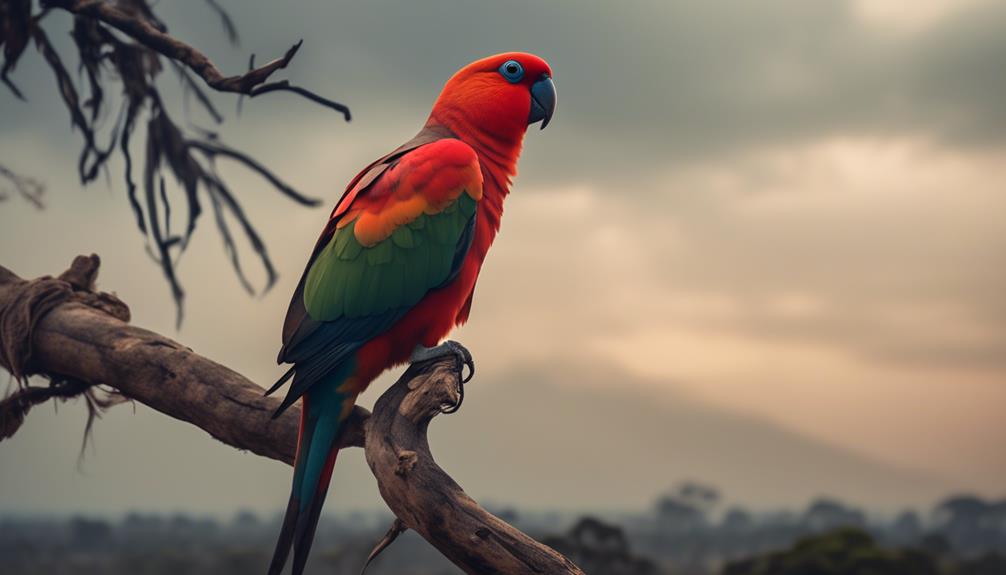
Climate change poses a significant threat to the Moluccan King Parrot and its delicate ecosystem. Rising temperatures and changing weather patterns directly affect the parrot’s natural habitat, the rainforests of Indonesia. These rainforests provide the necessary food sources and shelter for the parrot’s survival.
However, with climate change, these ecosystems are becoming increasingly unstable. Extreme weather events such as droughts and floods disrupt the availability of food and nesting sites for the parrots. Additionally, as the rainforests shrink due to deforestation, the parrots are left with limited resources and are more vulnerable to the impacts of climate change.
The loss of their habitat, combined with the stress of climate change, puts the Moluccan King Parrot at a higher risk of population decline and potential extinction. Urgent action is needed to mitigate the effects of climate change and protect this unique species.
Conservation Efforts for the Moluccan King Parrot
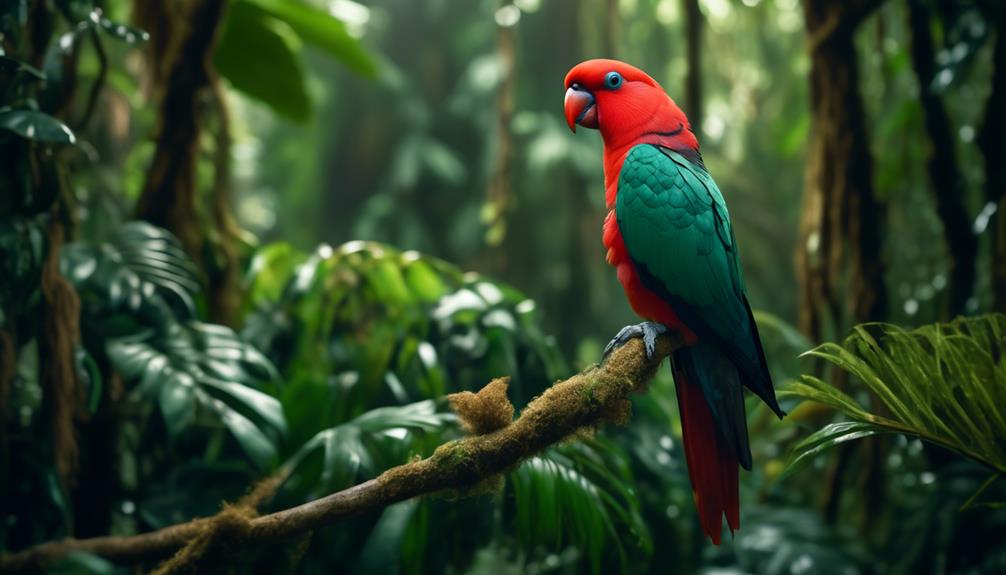
To protect the Moluccan King Parrot from the threats it faces, conservation efforts are crucial in safeguarding its future. Here are some key initiatives that are being undertaken to ensure the survival of this beautiful bird:
- Habitat Protection: Preserving and protecting the natural habitats of the Moluccan King Parrot is essential. Efforts are being made to establish protected areas and national parks where the parrots can thrive undisturbed.
- Anti-Poaching Measures: Illegal capture for the pet trade is a major threat to the Moluccan King Parrot. Strong enforcement of laws against poaching and smuggling, along with increased surveillance and monitoring, are being implemented to combat this issue.
- Community Engagement: Engaging local communities in conservation efforts is vital. Raising awareness about the importance of protecting the Moluccan King Parrot and providing alternative livelihood opportunities can help reduce the pressure on its habitat.
- Research and Monitoring: Continuous research and monitoring of the population and behavior of the Moluccan King Parrot are necessary to assess the effectiveness of conservation efforts and identify any emerging threats.
Importance of Protecting the Species
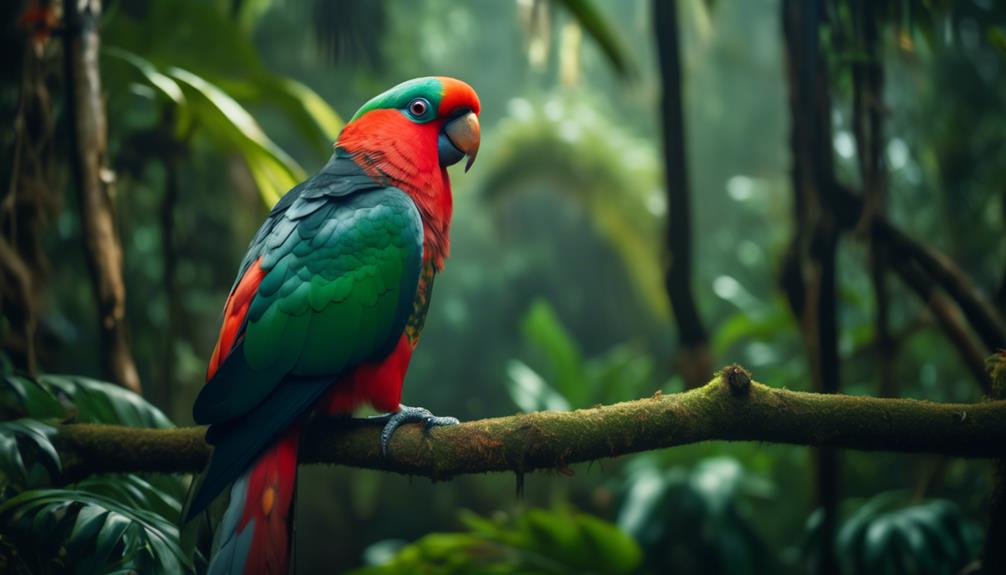
Preserving the Moluccan King Parrot is crucial to safeguard its future and ensure the survival of this beautiful bird.
As a vibrant member of the parrot species, the Moluccan King Parrot adds a touch of splendor with its mix of green, blue, and red colors. It not only produces quiet sounds and natural calls but can also mimic other sounds, showcasing its intelligence and playful nature.
By protecting this species, we can maintain the delicate balance of nature and preserve its unique characteristics.
With its native region in Indonesia, the Moluccan King Parrot thrives in large rainforests, plantations, gardens, and farmlands. Unfortunately, illegal capture and habitat destruction pose significant threats to their survival.
Collaboration With Local Communities for Conservation
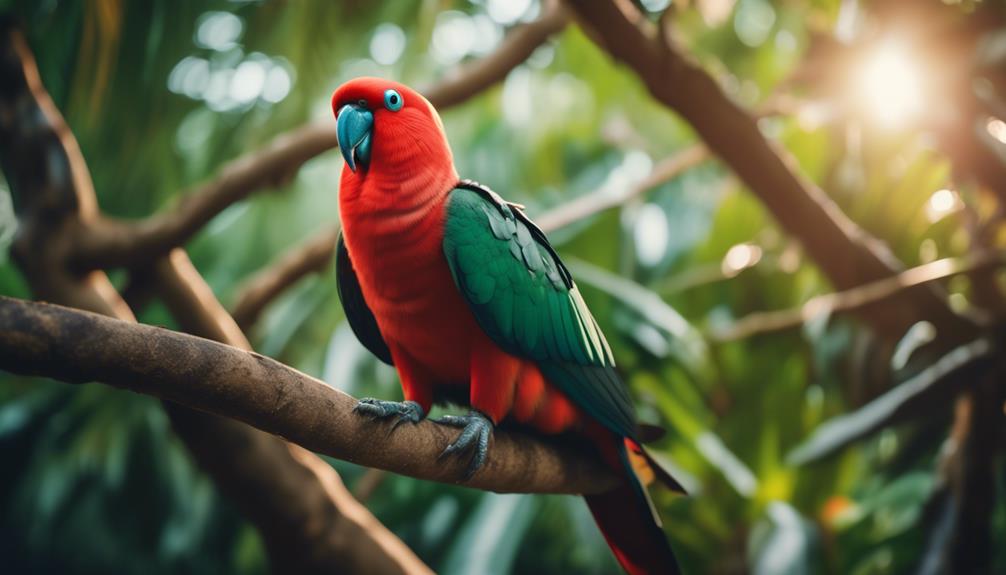
By actively engaging with local communities, we can foster collaboration to protect the Moluccan King Parrot and ensure its long-term conservation. This collaboration is crucial for the survival of the species, as it allows for a comprehensive and sustainable approach to conservation efforts.
Here are four key benefits of collaborating with local communities:
- Knowledge Sharing: Local communities possess valuable knowledge about the parrots’ behavior, habitat, and threats they face. By working together, we can exchange information and gain a deeper understanding of the species, enabling more effective conservation strategies.
- Community Ownership: Involving local communities in conservation efforts instills a sense of ownership and responsibility. When communities feel a personal connection to the parrots, they’re more likely to actively participate in conservation activities and protect their natural habitat.
- Sustainable Livelihoods: Collaborating with local communities allows us to develop sustainable livelihood options that don’t harm the parrots or their habitat. By providing alternative sources of income, such as eco-tourism or sustainable agriculture, we can reduce the reliance on activities that pose a threat to the species.
- Cultural Preservation: The Moluccan King Parrot holds cultural significance for many local communities. By involving them in conservation, we can ensure the preservation of cultural traditions and practices associated with the parrots, fostering a sense of pride and heritage.
Engaging with local communities isn’t only essential for the protection of the Moluccan King Parrot but also for the well-being of the communities themselves. Together, we can create a sustainable future for both the parrots and the people who share their habitat.
Role of Government in Protecting the Moluccan King Parrot
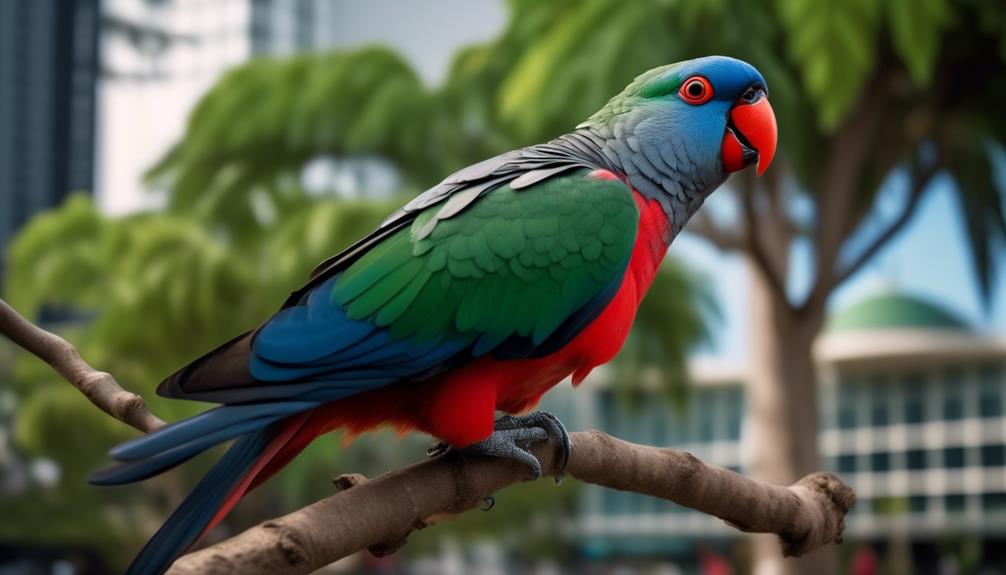
The government plays a crucial role in protecting the Moluccan King Parrot by implementing and enforcing conservation measures. They have the power to create and enforce laws that prohibit the illegal capture and trade of these endangered birds.
By working closely with local communities, the government can raise awareness about the importance of preserving the natural habitat of the Moluccan King Parrot and the consequences of its destruction. They can also provide funding and resources for research and conservation programs that aim to monitor and protect the population of these birds in the wild.
Additionally, the government can establish protected areas and implement strict regulations to ensure the survival and well-being of the Moluccan King Parrot.
Without the active involvement of the government, the threats faced by these beautiful birds would continue to escalate, placing them at an even greater risk of extinction.
The Future of the Moluccan King Parrot
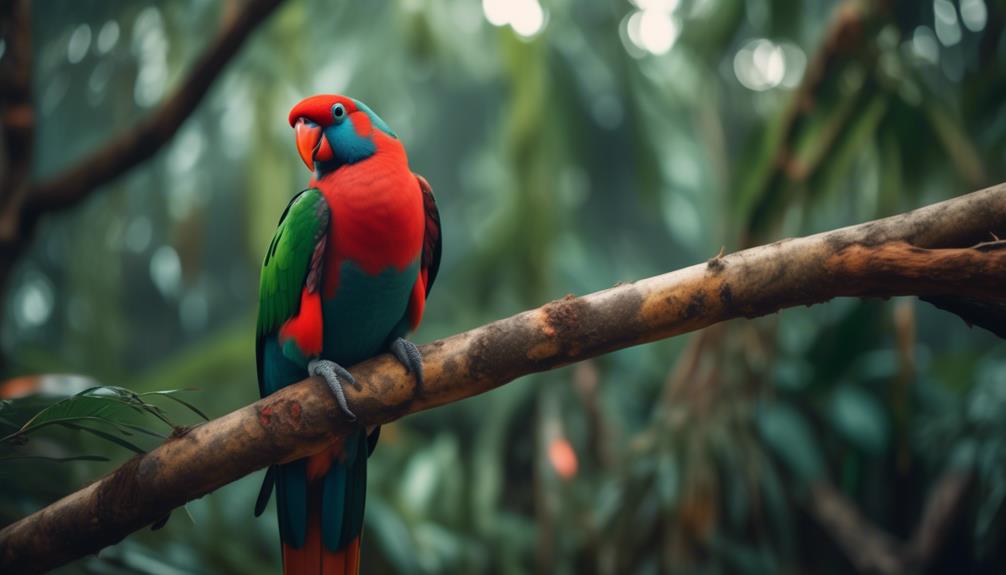
To ensure the survival of the Moluccan King Parrot, proactive measures must be taken to address the growing threats it faces. This beautiful bird, with its vibrant mix of green, blue, and red feathers, is a valuable species that needs protection. Here are four key steps that can help secure the future of the Moluccan King Parrot:
- Implement strict laws and regulations to prevent illegal capture and trade of these parrots.
- Preserve and restore their natural habitat by establishing protected areas and promoting sustainable land use practices.
- Conduct research and monitoring programs to better understand their population dynamics and behavior.
- Raise awareness about the importance of conserving the Moluccan King Parrot through education and outreach initiatives.
How Individuals Can Help Save the Species
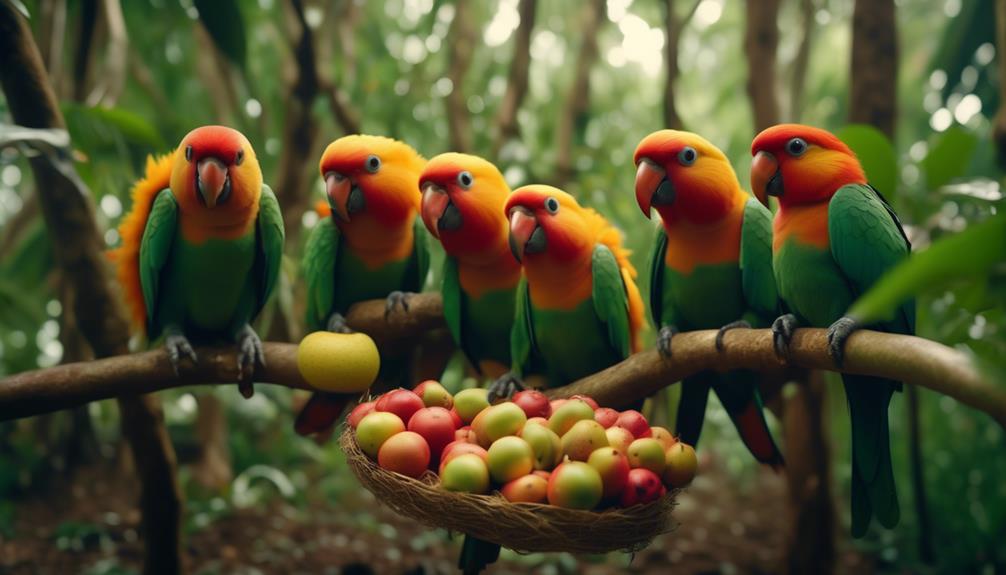
If you’re passionate about protecting wildlife and want to make a difference, there are several practical ways you can contribute to saving the Moluccan King Parrot from its growing threats. By taking action, you can help ensure the survival of this beautiful and unique species. Here are some ways you can help:
| Ways to Help Save the Moluccan King Parrot | Description | Impact |
|---|---|---|
| Support conservation organizations | Donate to or volunteer with organizations dedicated to protecting the Moluccan King Parrot and its habitat. | Your contributions will directly support conservation efforts and help raise awareness about the species. |
| Promote responsible pet ownership | Encourage others to adopt pets from reputable sources and avoid purchasing wild-caught parrots. | By reducing demand for illegally captured birds, you are helping to protect the Moluccan King Parrot and other endangered species. |
| Preserve natural habitats | Support initiatives that promote sustainable land management practices and protect the rainforests where the Moluccan King Parrot thrives. | By preserving their natural habitat, you are ensuring a future for the species and the ecosystem it inhabits. |
| Educate others | Share information about the Moluccan King Parrot’s threats, conservation status, and the need for action. | By raising awareness, you can inspire others to join the cause and make a difference. |
Together, we can work towards saving the Moluccan King Parrot and ensure that future generations can enjoy the beauty of this exotic species.
Frequently Asked Questions
How Do Moluccan King Parrots Contribute to Their Natural Habitat?
Moluccan King Parrots contribute to their natural habitat by spreading seeds and pollinating plants through their feeding habits. They also play a vital role in maintaining the balance of the ecosystem they inhabit.
What Are the Main Threats to the Moluccan King Parrot’s Natural Habitat?
The main threats to the Moluccan King Parrot’s natural habitat are illegal capture and habitat destruction. These actions are putting the wild populations at risk and endangering the survival of this exotic bird species.
How Does Illegal Capture and the Pet Trade Affect the Moluccan King Parrot Population?
Illegal capture and the pet trade significantly decrease the Moluccan King Parrot population. They are taken from their natural habitat, disrupting the ecosystem. It’s crucial to address this issue to ensure their survival.
What Are the Specific Effects of Deforestation on the Moluccan King Parrot?
Deforestation affects the Moluccan King Parrot by destroying their natural habitat. As a result, their population decreases, making them more vulnerable to extinction. You should support conservation efforts to protect their homes.
How Does Climate Change Impact the Moluccan King Parrot and Its Survival?
Climate change can impact the Moluccan King Parrot and its survival by altering its natural habitat, causing temperature fluctuations and disrupting food sources. These changes can lead to decreased reproductive success and increased vulnerability to diseases.
What Are the Similar Threats Faced by Vasa Parrots and Moluccan King Parrots?
Both hardy Vasa parrots and Moluccan king parrots face similar threats in the wild, such as habitat loss, illegal trapping for the pet trade, and competition for food sources. These challenges have led to declining populations for both species, making conservation efforts critical for their survival.
Conclusion
In conclusion, the Moluccan King Parrot is a magnificent bird species facing numerous threats to its survival. Illegal capture and habitat destruction are putting this beautiful parrot at risk.
However, with collaborative efforts from local communities, governments, and individuals, there’s hope for the future of this species. By raising awareness, supporting conservation initiatives, and taking action to protect their natural habitat, we can help ensure the continued existence of the Moluccan King Parrot for generations to come.

